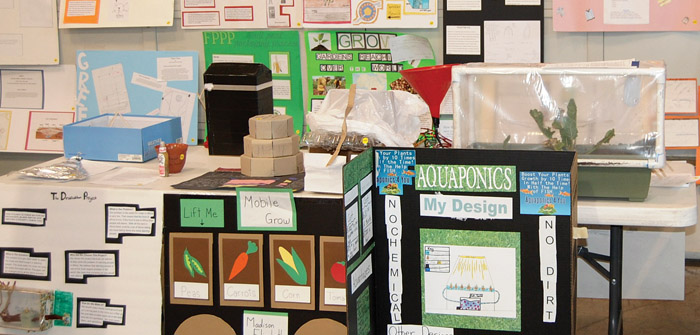Picture a mat of woven cornhusks floating on a pond and supporting a crop of tasty vegetables. That was one of the hundreds of solutions proposed by local students to help feed the world’s people. Some 1,150 Central Oregon students proposed new ways to improve agricultural equipment, systems, or processes in Inventerprise 2014, the annual science problem-solving contest sponsored by Bend Research, a division of Capsugel Dosage Form Solutions, with help from Bend-La Pine Schools and Central Oregon Community College.
Winners were announced this week in this year’s 23rd annual contest. Students from 32 Central Oregon schools in Grades K-12 submitted about 900 entries, competing for cash and other prizes.
This year, students were challenged to devise a new way to grow, produce or deliver foods to the burgeoning world population. Their responses ranged from an 8-in-1 garden gadget modeled after a Swiss army knife to robotic bee drones legislative proposals.
The floating field idea was one of many projects aimed at increasing the space available for crops. Other students came up with rooftop gardens and even entire roofs that can be grazed.
Two Summit High School students tied for first place in the high-school division and will pocket $700 each. Annie Jarvis, a senior, proposed legislation to encourage the planting of wildflower groves, which help support bee populations. Junior Tristan Fischer’s idea was to promote the ancient grains quinoa and teff in drought-susceptible regions of Africa because of their hardiness and nutritional value.
Summit sophomore Quintin McCoy will receive $300 for his second-place entry for a biodegradable fertilizer cube that retains water and releases fertilizer over time. Two Culver High freshmen, Kyle Caldwell and Chris Castellanos, got honorable mention for their smart watch with agricultural features. They will receive $50 apiece.
In the middle-school division, three students will receive grand prizes. Anna Marie Covlin, Peter Davio, and Jason Thompson from St. Francis School built a prototype of a new food packaging that uses discarded fruit peels as raw material. Each of the winners can choose from among an iPod, a mountain bike, a GoPro camera, a tablet computer and a season pass to Mount Bachelor for his or her prize.
Hundreds of students in lower grades submitted entries, either individually or in teams of up to three. Several students at each grade level will receive prizes for their efforts, along with an invitation to a special Science Night program held in their honor at the Bend Research laboratories in Tumalo.
Entries this year were inventive, particularly another idea for dealing with decreasing bee populations: tiny robot bee drones that seek out flowering plants and help spread the pollen. They would, of course, be programmed to return “home” to recharge their batteries.
In this year’s contest, crop yield enhancement got plenty of attention. A first-grader drew and described a garden box that diverts crop-eating birds with a trap door. Clever second-graders made a ground mat that absorbs heat and doubles as a drip irrigator. Some fourth-graders believe they can help wheat harvests with their improved combine. Numerous ideas were focused on recycling water to put back onto farmlands.
One fourth-grader devised an idea to feed pigs economically. He worked out a deal with a local grocer to shred, dry, and compress some of the store’s produce waste so it can be stored or fed directly to the porkers. A fifth-grader proposed black-fly farming for food, claiming they provide about 10 times the protein yield of beef and flies “taste like bacon. Who doesn’t like bacon?”





